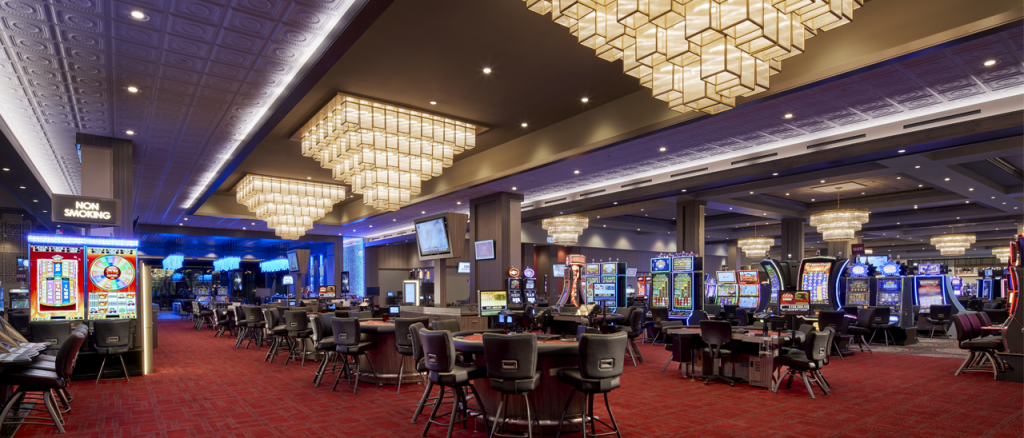Caesars Southern Indiana $250M Sale to EBCI Holdings Gets State Approval
Posted on: August 19, 2021, 07:30h.
Last updated on: August 19, 2021, 01:20h.
The Indiana Gaming Commission (IGC) approved the sale of Caesars Southern Indiana to a new venture formed by the Eastern Band of Cherokee Indians on Wednesday.

Caesars Entertainment announced on Dec. 24 that it reached a deal to sell the Elizabeth, Ind., casino for $250 million to EBCI Holdings. EBCI Holdings was created to help the North Carolina-based tribal nation expand its gaming operations through commercial acquisitions and developments.
Located in Elizabeth, Ind., directly across the Ohio River from Louisville, Caesars Southern Indiana is the largest casino in the southern part of the state. While seven of the state’s 12 casinos offered more slot machines than the 1,136 Caesars operated last month, only Horseshoe Hammond’s 127 table games surpassed the 87 Caesars ran.
Caesars Southern Indiana reported adjusted gross revenues of $21.3 million in July, according to an IGC report. That ranked fourth among the state’s casinos, behind Horseshoe’s $34.3 million, Hard Rock Northern Indiana’s $31.2 million, and Indiana Grand’s $29.9 million.
The casino had a $90 million transformation from a riverboat to a land-based venue in December 2019. Caesars Southern Indiana also offers a 503-room hotel, a steakhouse, and other dining establishments, retail outlets, and a nearby golf course.
EBCI Holdings will enter into a lease with a subsidiary of gaming real estate investment trust VICI Properties as part of the transaction. Under the leasing terms, the new casino owner will pay $32.5 million annually for 15 years, with four five-year options available.
Adele Jacobs-Madden, CFO of EBCI Holdings, told the commission that financing for the transaction includes $120 million in equity from the tribe and $160 million through Wells Fargo. It’s expected the financing will close in early September, with the sale finalized after that.
Licensing Deal Lets Casino Keep Caesars Name
While Caesars Entertainment will no longer own the casino, it will still retain the company’s branding through a licensing deal. Besides keeping the iconic brand, it will also continue to use the Caesars Rewards loyalty program and operate a Caesars Sportsbook onsite.
Caesars and the Eastern Band of Cherokee Indians have a relationship that dates back nearly a quarter-century when the tribe opened its Harrah’s Cherokee Casino. Six years ago, a second Harrah’s casino opened on EBCI land in western North Carolina.
Beyond that, EBCI Holdings CEO Scott Barber served as a longtime Caesars manager and executive. Jacobs-Madden is an enrolled EBCI manager and served as a finance executive for the band’s casinos. Both have more than 50 years of combined gaming management experience.
We’re excited that Caesars Southern Indiana is our first acquisition, and look forward to doing business in Indiana,” Barber told Casino.org.
A ribbon-cutting celebration to mark the change in ownership is planned in the coming weeks after the transaction closes, and EBCI Holdings expects to retain all 900 current employees.
EBCI Holdings will also join Caesars as a partner in the development of a casino in Danville, Va. Aside from that, the company is also looking into pursuing a sports betting license in North Carolina if lawmakers legalize wagering in the state.
New Competition Prompts EBCI Move
The Eastern Band of Cherokee Indians is making the move into the commercial gaming realm as it sees gaming competition growing in North Carolina and the surrounding states.
Its Harrah’s casinos were the only venues in the state until the Catawba Indian Nation opened its Two Kings Casino in Kings Mountain, 30 miles west of Charlotte. EBCI challenged the order allowing that casino, but that was denied in federal court.
Meanwhile, Virginia’s decision to legalize casino gaming led to that state approving one in Bristol. Both it and Two Kings are roughly two-and-a-half hours away in different directions, meaning they will attract significant portions of the Cherokee’s market.
Faced with losing up to $100 million in gaming revenue used to fund its schools, health care, and housing initiatives, EBCI Principal Chief Richard Sneed proposed funding a new company that would operate commercial casinos.
Some tribal council members expressed concerns about the venture, including using existing EBCI trust funds toward the acquisition. However, as EBCI’s exclusive negotiating window was closing late last year, leaders agreed to move forward with the plan.
There are some differences between operating a tribal casino and a state-licensed one. Most notably, there are limits on how much revenue commercial casino operators can pull from a property.
According to the plan presented by EBCI Holdings to the IGC, EBCI Holdings has set up another limited liability company to receive the income generated by Caesars Southern Indiana. After that company makes the lease and financing payments, the remainder of the revenues will go to EBCI Holdings. It will then give the tribe 25 percent of those proceeds while retaining the remainder to reinvest in its properties and buy or build new ones.
Merger Forced Caesars to Sell
Caesars put the Southern Indiana casino on the market after the IGC signed off on Eldorado Resorts’ $17.3 billion takeover of the Las Vegas-based gaming giant in July 2020. The commission’s approval, though, was conditional, provided the newly merged company sold three of its five Indiana properties by the end of last year.
Gaming officials raised concerns about the company’s control of the Indiana market. At the time the Caesars-Eldorado sale was approved, the five properties generated more than 61 percent of the state’s adjusted gross gaming revenues.
In June, Caesars closed on its $480 million deal announced last fall to sell Tropicana Evansville to Bally Corp. and Gaming and Leisure Properties. The Commission then extended Caesars’ deadline to find a buyer for the third casino, before ultimately waiving the requirement in June. If forced, Caesars would have put Horseshoe Hammond – the state’s largest casino – on the market.
Caesars, which initially proposed selling just two properties, cited concerns about selling the property for a fair value in the current market, especially with neighboring Illinois seeking to open several new casinos in the region in the coming years. Hammond Mayor Thomas McDermott Jr. also lobbied on Caesars’ behalf. In a letter to the IGC, he feared a lesser company would buy the property and reduce the economic impact of “the city’s most important private industry.”
In addition, the opening of nearby Hard Rock Northern Indiana in Gary and the introduction of Class III gaming at the Four Winds tribal casino in South Bend reduced the market share of the three remaining properties. And the eventual opening of a casino in Terre Haute would reduce that even more, Caesars’ CEO Tom Reeg said at the time.
Related News Articles
Caesars Southern Indiana Now Owned by EBCI Holdings as $250 Million Sale Closes
Oh, No, Ozempic: Weight-Loss Drugs Could Weigh on Casino Revenue
Most Popular
FTC: Casino Resort Fees Must Be Included in Upfront Hotel Rates
Genovese Capo Sentenced for Illegal Gambling on Long Island
NBA Referees Expose Sports Betting Abuse Following Steve Kerr Meltdown
UPDATE: Former Resorts World & MGM Grand Prez Loses Gaming License
Most Commented
-
UPDATE: Whiskey Pete’s Casino Near Las Vegas Closes
— December 20, 2024 — 30 Comments -
Caesars Virginia in Danville Now Accepting Hotel Room Reservations
— November 27, 2024 — 9 Comments -
UPDATE: Former Resorts World & MGM Grand Prez Loses Gaming License
— December 19, 2024 — 8 Comments -
FTC: Casino Resort Fees Must Be Included in Upfront Hotel Rates
— December 17, 2024 — 7 Comments
















No comments yet